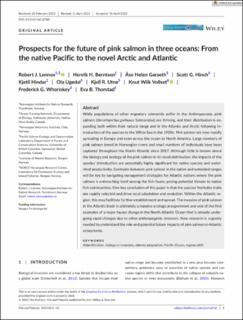Prospects for the future of pink salmon in three oceans: From the native Pacific to the novel Arctic and Atlantic
Lennox, Robert; Berntsen, Johan Henrik Hårdensson; Garseth, Åse Helen; Hinch, Scott G.; Hindar, Kjetil; Ugedal, Ola; Utne, Kjell Rong; Vollset, Knut Wiik; Whoriskey, Frederick G.; Thorstad, Eva Bonsak
Peer reviewed, Journal article
Published version

Åpne
Permanent lenke
https://hdl.handle.net/11250/3069960Utgivelsesdato
2023Metadata
Vis full innførselSamlinger
- Publikasjoner fra CRIStin - NINA [2364]
- Scientific publications [1392]
Originalversjon
10.1111/faf.12760Sammendrag
While populations of other migratory salmonids suffer in the Anthropocene, pink salmon (Oncorhynchus gorbusca Salmonidae) are thriving, and their distribution is expanding both within their natural range and in the Atlantic and Arctic following introduction of the species to the White Sea in the 1950s. Pink salmon are now rapidly spreading in Europe and even across the ocean to North America. Large numbers of pink salmon breed in Norwegian rivers and small numbers of individuals have been captured throughout the North Atlantic since 2017. Although little is known about the biology and ecology of the pink salmon in its novel distribution, the impacts of the species' introduction are potentially highly significant for native species and watershed productivity. Contrasts between pink salmon in the native and extended ranges will be key to navigating management strategies for Atlantic nations where the pink salmon is entrenching itself among the fish fauna, posing potential threats to native fish communities. One key conclusion of this paper is that the species' heritable traits are rapidly selected and drive local adaptation and evolution. Within the Atlantic region, this may facilitate further establishment and spread. The invasion of pink salmon in the Atlantic basin is ultimately a massive ecological experiment and one of the first examples of a major faunal change in the North Atlantic Ocean that is already undergoing rapid changes due to other anthropogenic stressors. New research is urgently needed to understand the role and potential future impacts of pink salmon in Atlantic ecosystems. Atlantification, biological invasions, climate adaptation, Pacific Ocean, regime shift
